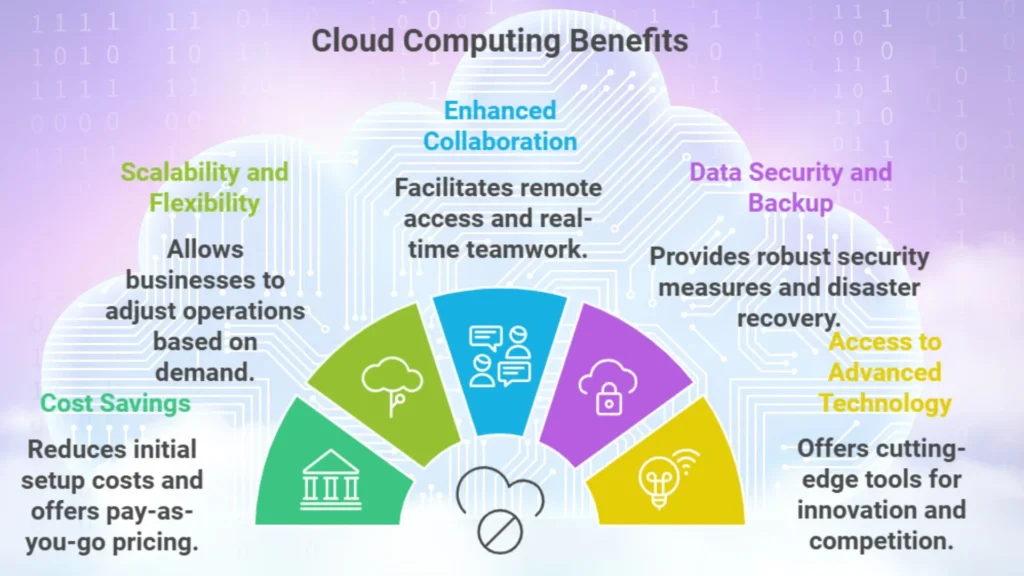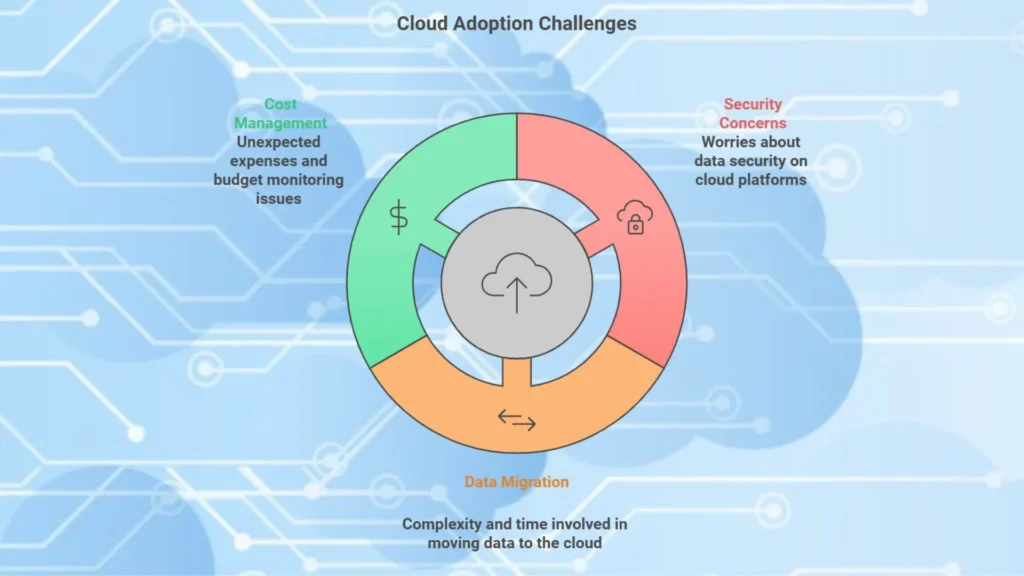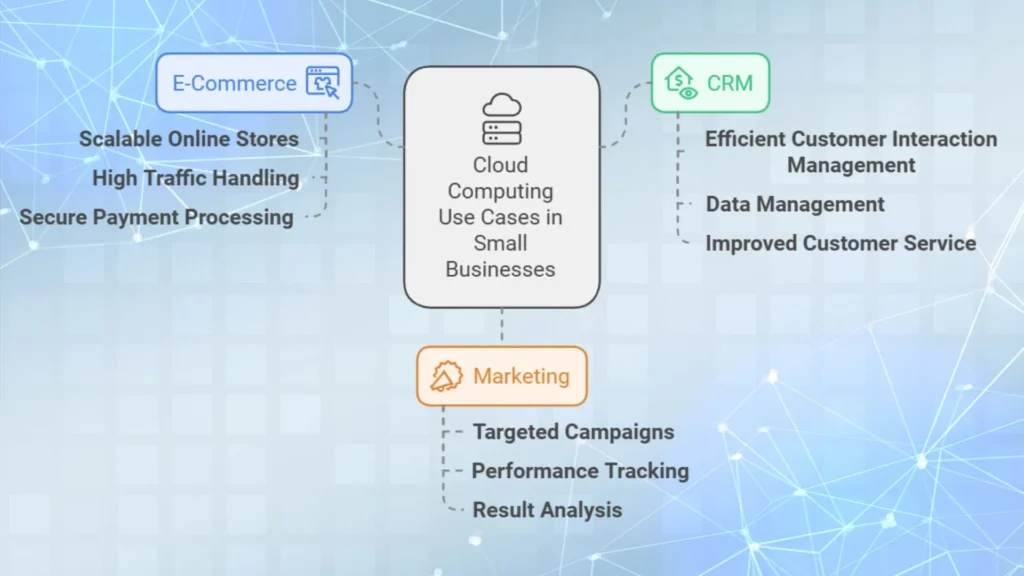Now a days, cloud computing has become a game changer for small businesses and startups. It offers solutions that streamline processes, reduce costs and enable scalability. Cloud computing for small businesses and startups has became a necessity to stay competitive and adaptable in global market.
Benefits of Cloud Computing for Small Businesses and startups
Cloud computing provides following benefits for small businesses and startups:
1. Cost Savings
Cloud services eliminate the need for expensive on site physical servers and hardware, which reduces initial setup costs. Small businesses can access powerful computing resources without heavy upfront investments.
Cloud services often operate on a pay-as-you-go model, which allows businesses to pay only for the resources they use. This flexibility helps manage costs effectively.
2. Scalability and Flexibility
Flexible Resources: Cloud computing allows small businesses to scale up or scale down their operations based on demand. Whether it’s for a seasonal spike in demand or long term growth, businesses can adjust without investing in new hardware or infrastructure.
Future Proofing: As the business grows, cloud services can easily accommodate increased workloads and storage needs.
3. Enhanced Collaboration and Remote Access
Remote Access: Employees can access files and applications from any location, which enables collaboration and remote work. This is especially beneficial for small businesses with geographically distributed teams.
Real Time Collaboration: Cloud based tools enable team members to work on documents and projects simultaneously, which improves productivity and teamwork.
4. Improved Data Security and Backup
Advanced Security Features: Cloud providers implement strong security measures like encryption, firewalls, access control and regular updates. This protects data from breaches and cyber threats or frauds.
Disaster Recovery: Cloud services offer automatic backups and disaster recovery solutions, which ensures business continuity even in the face of data loss or system failures.
5. Access to Advanced Technology
Innovation: Cloud platforms provide access to cutting edge technologies such as artificial intelligence, machine learning and big data analytics. Small businesses can take benefit of these tools to gain insights and innovate without significant investments.
Competitive Edge: By adopting cloud solutions, small businesses can compete with larger enterprises by harnessing the same advanced technologies.

Top Cloud Solutions for Small Businesses
Choosing the right cloud solution can make a significant difference. Here are some of the top cloud providers that offer strong solutions for small businesses:
Google Workspace:
An affordable suite of cloud tools including Gmail, Google Docs, Sheets and Drive. Google Workspace supports real time collaboration, which makes it ideal for small teams.
Amazon Web Services (AWS):
AWS offers a wide array of cloud services from storage and computing to advanced AI capabilities. With “pay-as-you-go” pricing and scalability, AWS is suitable for small businesses with growth potential.
Microsoft Azure:
Known for its integration with Microsoft 365, Azure is a flexible cloud solution with options for application hosting, virtual machines and extensive data analytics tools. Azure’s hybrid cloud solutions are particularly advantageous for businesses that want a mix of on site and cloud resources.
Case Studies: Small Businesses using Cloud Technology
1. Dropbox:
This cloud based storage solution initially started as a small business that relied on cloud services to deliver file sharing capabilities. Its ability to scale with demand led to rapid growth. Dropbox is on the path to become an industry leader in cloud storage.
2. Airbnb:
Using Amazon Web Services (AWS) since its early days, Airbnb used cloud technology to handle massive user data and support peak demands during busy travel seasons. The scalability and flexibility of AWS allowed Airbnb to expand rapidly without investing heavily in physical infrastructure.
3. Slack:
Slack utilized Google Cloud Platform to support its real time messaging capabilities and remote collaboration. The cloud based infrastructure allowed Slack to operate seamlessly, which enabled them to accommodate millions of daily users as the company grew.
Use Cases in Small Businesses
E-Commerce:
Cloud computing supports scalable online stores, which enables small businesses to handle high traffic volumes and secure payment processing.
Customer Relationship Management (CRM):
Cloud based Customer Relationship Management systems help small businesses manage customer interactions and data efficiently.
Marketing:
Cloud platforms offer powerful marketing tools that enable small businesses to run targeted campaigns, track performance and analyze results.
Challenges for Small Businesses in Cloud Adoption:
Cloud computing offers numerous benefits to small businesses, however they may face certain challenges:
Security Concerns:
Small businesses may worry about the security of sensitive data on cloud platforms.
Solution: Choose providers with strong security certifications (e.g., ISO 27001) and use additional safeguards like two factor authentication (2FA).
Data Migration:
Moving data to the cloud can be time consuming and technically complex.
Solution: Consider a phased migration plan and consult with cloud experts for guidance.
Cost Management:
Cloud services can be cost effective, but unexpected expenses can arise if usage is not closely monitored.
Solution: Set up usage alerts and regularly review billing statements to stay within budget.

Conclusion
Adopting cloud technology empowers small businesses and startups to compete in the global market, which offers flexibility, security and productivity tools to progress and grow in the market.
By using cloud computing, small businesses can access high performance resources that were once available only to large corporations. This technology allows small teams to work efficiently, minimize costs and adapt to market changes. This strategy makes cloud computing a powerful asset for modern small businesses.



Thanks for sharing. I read many of your blog posts, cool, your blog is very good.
Your article helped me a lot, is there any more related content? Thanks!